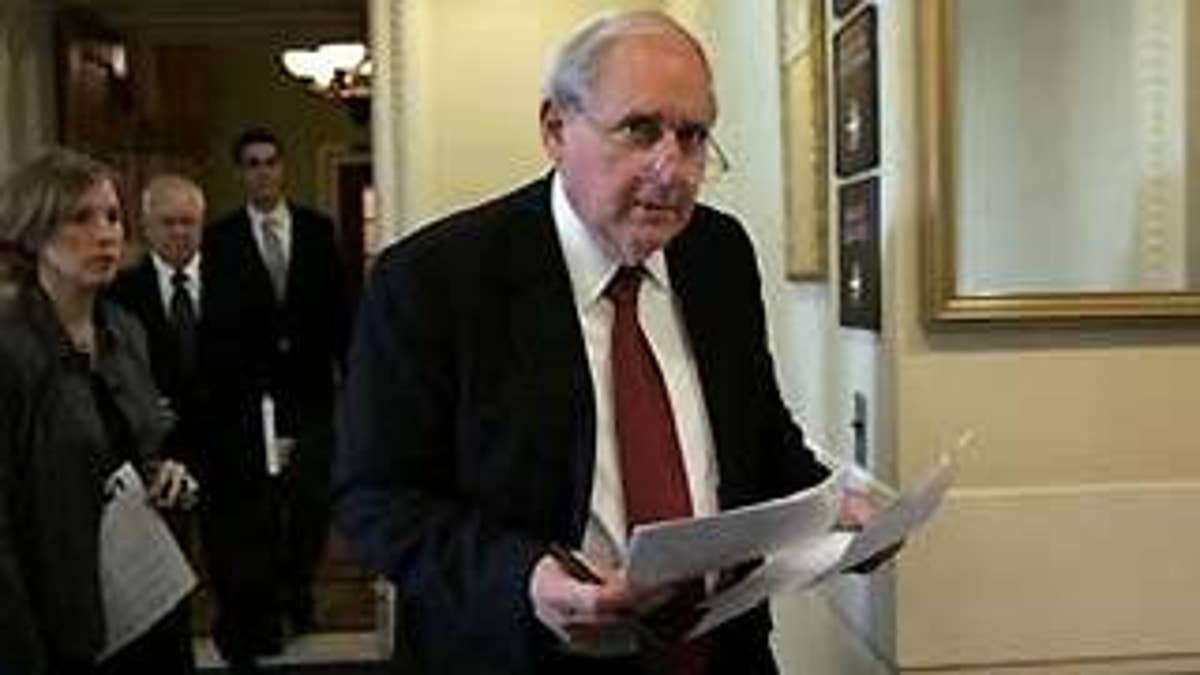
The debate whether to send more combat troops to Afghanistan took a twist reminiscent of the Iraq conflict when the head of the Senate Armed Services Committee on Friday advised not sending any more U.S. combat troops to Afghanistan beyond those already approved by President Obama until more Afghan security forces are trained.
Speaking on the eighth anniversary of the date the United States was attacked by terrorists trained in Afghanistan, Chairman Carl Levin, D-Mich., also called for a shift in U.S. efforts toward more trainers, who could, in part, be supplied by NATO allies. He said he would like a plan for Afghanistan that would replicate the "Sons of Iraq" strategy to separate low and mid-level Taliban fighters in Afghanistan from the leadership of that terrorist group.
Levin added that more equipment could be moved from Iraq to Afghanistan as U.S. efforts wind down in Iraq.
"In order to succeed in Afghanistan we need a surge of Afghan forces," Levin said, adding that "we have not done nearly enough."
If the shift is not made, "I think it's less likely we'll succeed in Afghanistan," he said.
Republicans immediately described Levin's remarks as the same sound of surrender by Democrats during the dark days of the Iraq war.
"Many of the Democrats raising questions about our efforts in Afghanistan are the same voices who declared General Petraeus a failure in Iraq before his new strategy even had a chance to succeed. They were wrong then. They are wrong now," said House Minority Leader John Boehner, R-Ohio.
Arizona Sen. John McCain, the ranking Republican on the Senate Armed Services panel, said he "could not disagree more profoundly" with Levin on the call to limit troop deployments.
"If we await the day when the Afghan National Army is increased in size and capable of carrying out all of these operations fully on its own, it may well be too late," McCain warned.
Last month, McCain traveled to Afghanistan and recommended doubling the number of Marines in Helmand province -- a southern part of the country and largest region for opium poppy farming. Currently 9,000 Marines are in Helmand.
McCain had been among the first lawmakers to support the surge in Iraq, arguing at the time that too few troops had created an environment in which U.S. forces could not effectively train Iraqis while also preventing insurgent attacks across that country.
He said the situation is the same in Afghanistan today.
"The lesson of Iraq -- one that General McChrystal wants to put into place in Afghanistan -- is that we make little progress merely by putting individuals through a training course and releasing them into combat," McCain said.
"It took mentorship at every level -- including partnership in joint operations with U.S. forces -- that built a capable Iraqi security force. Similarly, mentorship at all levels is required to build a robust and capable Afghan military and pave the way for our eventual, successful exit in Afghanistan. To do this, we will need more U.S. combat forces in Afghanistan, not less or the same amount as we have today," he said.
Obama is reviewing an interim plan by the top commander in Afghanistan, Gen. Stanley McChrystal, who under pressure to limit his request, has not yet asked for more than the 61,000 troops currently committed to the fight.
Instead, McChrystal has called for a change-up in the kind of forces currently on the ground -- replacing support teams with combat units. But a conflict assessment complete with a force size recommendation is expected from the general soon.
Gen. Richard P. Formica, who heads up the American effort to train Afghan security forces, also is expected to deliver a report to Levin soon as to how many additional trainers are needed in the theater.
Levin said military commanders are currently developing a plan to speed up the training of the Afghan National Army (ANA) and Afghan National Police (ANP), and McChrystal is planning to call for an increase of the ANA to 240,000 and ANP to 160,000 by 2013.
Levin said this increase "is so important" that it should and can be stepped up and completed by 2012.
He added that he has conveyed this sentiment to both Defense Secretary Robert Gates and to Joint Chiefs of Staff Chairman Adm. Mike Mullen, as well as to Secretary of State Hillary Clinton.
In addition, the chairman, along with his fellow congressional delegation members, Sens. Jack Reed of Rhode Island and Ted Kaufman of Delaware will be meeting next week with National Security Adviser Gen. Jim Jones as well as Vice President Biden.
Sen. Jon Kyl, R-Ariz., said that if McChrystal does recommend an increase in the force level in Afghanistan, "I would think that those of us in Congress should support the president, support (CENTCOM Commander) Gen. (David) Petraeus and General McChyrstal and support our effort there by sending the additional troops that may be needed."
Levin would not say what might happen if McChrystal recommends more U.S. troops be deployed to Afghanistan, only that he hopes Obama listens to what he is recommending.
Levins remarks follow by one day House Speaker Nancy Pelosi's comment that she sees little support for sending additional troops to Afghanistan. Sen. Russ Feingold, D-Wis., previously has called for a timeline for withdrawing U.S. forces.
Click here for more FOXNews.com coverage of Afghanistan.
FOX News' Trish Turner contributed to this report.





















